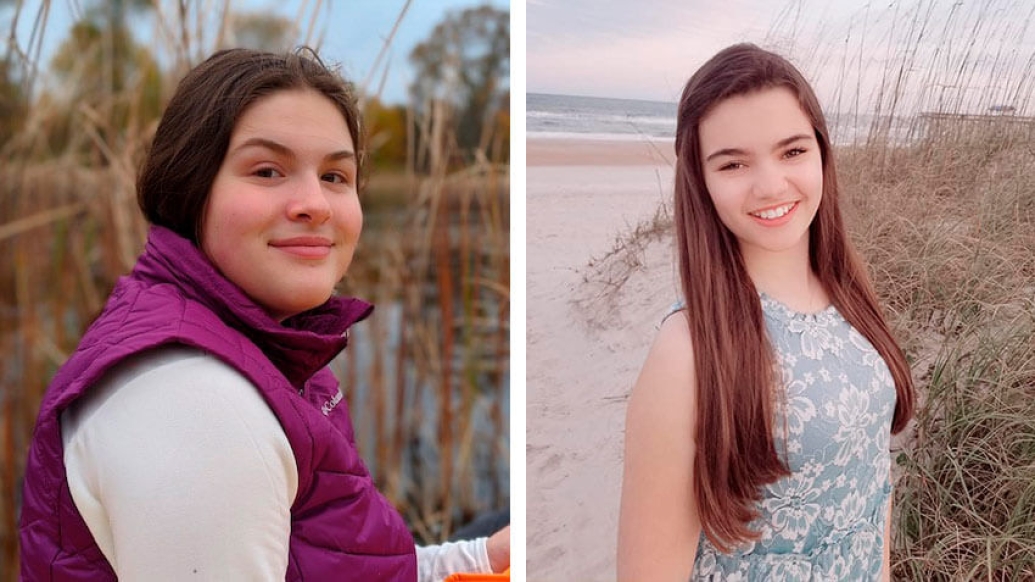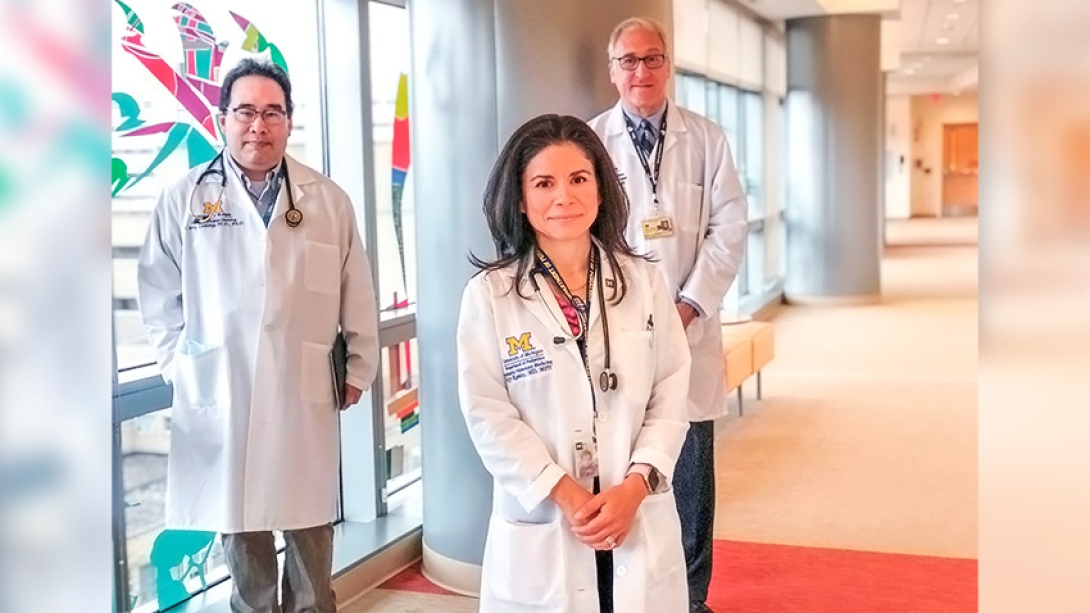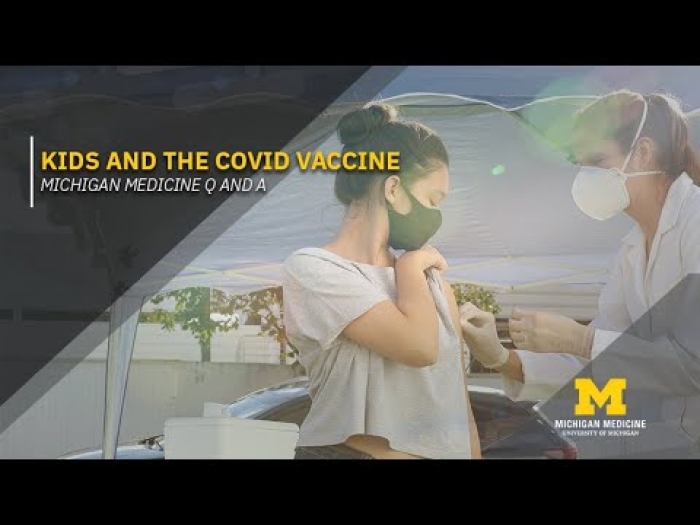New clinic focuses on children and teens who experience lingering symptoms after COVID, including respiratory issues, fatigue and joint pain.
5:00 AM
Author |

Madison Foor is a fit, healthy teen who has spent the last five years as a competitive dancer.
But now, months after a mild case of COVID, the eighth grader uses an inhaler for the first time in her life.
Short walks can also leave her winded. Headaches are frequent. She needs more breaks during dance lessons.
The 14-year-old is believed to be among a small but growing group of pediatric patients who may be experiencing long haul COVID, a much more commonly reported condition in adults. While the majority of children and teens have mild COVID-19 symptoms or are asymptomatic, some face persistent symptoms months after recovery or develop a rare but serious COVID-linked condition called multisystem inflammatory syndrome, or MIS-C.
In response, Michigan Medicine C.S. Mott Children's Hospital has opened the Pediatric Post-COVID Syndrome Clinic, believed to be the first in the state to specifically serve this population of young patients.
"We've seen children who have breathing issues and other lingering symptoms long after an initial infection," says Carey Lumeng, M.D., Ph.D., Mott pediatric pulmonologist who leads the new clinic.
"Most of their COVID infections were mild and didn't require hospitalization or even outpatient care. Our goal is to better understand this phenomenon in young people and ensure that patients see the right group of specialists to address their specific symptoms."
Last year, more than 2 million of the nearly 30 million confirmed cases of COVID-19 in the U.S. involved children, according to the Centers for Disease Control. That includes over 115,000 children in the state of Michigan.
MORE FROM MICHIGAN: Sign up for our weekly newsletter
But it's unclear how many young patients have long-term symptoms known as post-COVID syndrome or "long COVID." Symptoms may include fatigue, shortness of breath, joint pain, chest pain, cough and loss of taste or smell. Mott has seen more than a dozen cases so far.
The Mott post-COVID syndrome clinic is for patients under age 21 who've been referred by a primary care provider and whose symptoms have continued beyond six weeks after an infection. It brings together several specialties, including pediatric pulmonology, cardiology, physical medicine and rehabilitation, and pediatric psychology to address young patients' unique needs.
Madison's mom, Mariha, of Dundee, Mich., says her daughter is slowly gaining back strength after her bout with COVID in January, but for the first few weeks couldn't even manage five minutes walking on a treadmill.
Understanding the short and long term effects in children after COVID will help us combat what may become a growing need.Carey Lumeng, M.D., Ph.D.
Among lingering symptoms are fatigue, shortness of breath and a foul taste in her mouth. Madison, who is receiving care through the new Mott post-COVID syndrome clinic, is "progressively getting better" and easing back into ballet, jazz and tap dance. But she still needs to take more breaks than usual, Mariha says.
"You hear a lot about kids not getting COVID as bad as adults, but there's no way to know which ones may be impacted by this," she says. "Madison was a perfectly healthy, active teen who is now using an inhaler."
"People told me she just needed more rest but I knew something else was wrong. Parents should trust their gut if their child isn't acting like themselves."
Jordyn Stickel, 13, of Orion Township, Mich., is also facing long-lasting symptoms after a mild case of COVID in November that included body aches and a low-grade fever.
The eighth grader loves outdoor hobbies, school and robotics. But for nearly half a year, she hasn't enjoyed any of those activities.
Jordyn still faces severe fatigue that keeps her in bed for most of the day, joint pain, chest pain, headaches and shortness of breath that makes a flight of stairs challenging. She's now seeing specialists at the new Mott clinic.
Jordyn's mom, Heather, says she's hopeful that the right care will help Jordyn get back to her usual self.
"As a parent it's crushing to see your kid be so miserable and isolated and not be able to do anything about it," says Heather who recently joined a UK-based Facebook group to connect with other parents whose children are experiencing similar symptoms.

"We're so grateful for the help we're getting at U-M from top tier doctors. We finally feel like we're being listened to and getting the right care to help Jordyn. My child deserves the best care possible."
Like Podcasts? Add the Michigan Medicine News Break on iTunes or anywhere you listen to podcasts.
The National Institutes of Health has launched new research to better understand how SARS-CoV-2 affects children short term and long term, why some children are at greater risk of infection than others, why symptoms vary among children and how to identify those at greatest risk of developing severe complications.
Researchers are also hoping to better understand risk factors behind the rare condition MIS-C, which causes severe inflammation in vital organs and tissues and could be life-threatening to children.
As the clinic treats more children with these symptoms, Lumeng says he hopes Mott teams will be able to contribute to national research studies on COVID in kids.
"Understanding the short and long term effects in children after COVID will help us combat what may become a growing need," Lumeng says.
"It's going to take some time before we get vaccines for all children, and we know we'll be dealing with this for quite a while. We hope to provide a uniform way to serve these patients and to learn more about how we can help them recover and get back to normal as much as possible."

Explore a variety of health care news & stories by visiting the Health Lab home page for more articles.

Department of Communication at Michigan Medicine
Want top health & research news weekly? Sign up for Health Lab’s newsletters today!





